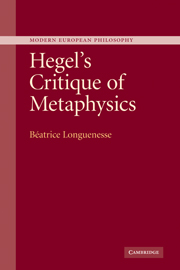Book contents
- Frontmatter
- Contents
- List of Abbreviations
- Note on Citations
- Preface
- PART I HEGEL'S CRITIQUE OF METAPHYSICS: A STUDY OF THE DOCTRINE OF ESSENCE
- Introduction
- 1 Transcendental logic and dialectical logic: from Kant to Hegel, a critique of all dogmatic metaphysics
- 2 Twists and turns of Hegel's contradiction
- 3 Ground against concept?
- 4 What is rational is actual, what is actual is rational
- Conclusion
- PART II POINT OF VIEW OF MAN OR KNOWLEDGE OF GOD
- Notes
- Bibliography
- Index
1 - Transcendental logic and dialectical logic: from Kant to Hegel, a critique of all dogmatic metaphysics
from PART I - HEGEL'S CRITIQUE OF METAPHYSICS: A STUDY OF THE DOCTRINE OF ESSENCE
- Frontmatter
- Contents
- List of Abbreviations
- Note on Citations
- Preface
- PART I HEGEL'S CRITIQUE OF METAPHYSICS: A STUDY OF THE DOCTRINE OF ESSENCE
- Introduction
- 1 Transcendental logic and dialectical logic: from Kant to Hegel, a critique of all dogmatic metaphysics
- 2 Twists and turns of Hegel's contradiction
- 3 Ground against concept?
- 4 What is rational is actual, what is actual is rational
- Conclusion
- PART II POINT OF VIEW OF MAN OR KNOWLEDGE OF GOD
- Notes
- Bibliography
- Index
Summary
The Science of Logic is a formidably difficult text. The foolhardy reader who dares to approach it is soon left with no other resource than to abandon herself to the engulfing Hegelian waters, or to pass by, and go set up philosophical camp elsewhere. For Hegel's Logic is a discourse that seems to be speaking only about itself and its own logical delirium. In order to grasp something of Hegel's philosophy, it seems that a more feasible approach might be to consider some part of it where it is drawn away from its soliloquy by its object: art (with Hegel's Lectures on Aesthetic), the State (with Hegel's Elements of the Philosophy of Right), history (with Hegel's Lectures on the Philosophy of History). Here at least, there remains some external authority that imposes on philosophical categories the test of their relation to the way things are. On this terrain, i.e. the domain of what Hegel calls the “Philosophy of Spirit,” Hegel's teachings continue to haunt our own times by the questions they put at the forefront: the development of human consciousness and its relation to what is external to it; the production of symbolic systems; the State, law, civil society.
However, approaching Hegel through his exoteric teachings is a way of skirting Hegel's project as he defined it.
- Type
- Chapter
- Information
- Hegel's Critique of Metaphysics , pp. 10 - 38Publisher: Cambridge University PressPrint publication year: 2007

